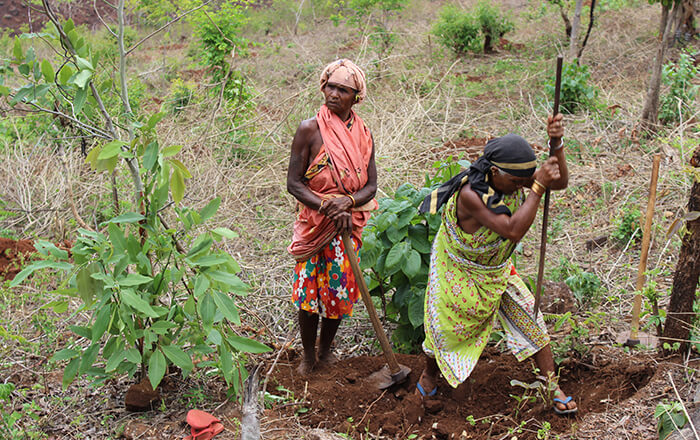
RECLAIMING THE COMMONS
Many needs of subsistence communities are fulfilled by women, who spend long hours on village commons. Their relentless work upholds the non-cash economy of the rural and tribal regions. Women play a significant role in the care and nurture of common lands, and yet are scarcely allowed to claim any ownership or rights over these lands. Over the years, this crucial role and function of women has been severely affected by the encroachment of commons by vested interests, which has not only pushed them out, but also resulted in their extensive degradation.
Recognizing the importance of the women – common lands relationship, Agragamee has taken up series of efforts to increase women’s access, control and rights over commons. Needless to emphasise, this has necessitated a multi-pronged efforts, looking at enabling provisions in empowering Acts like the PESA Act, addressing conflict areas, strengthening women’s groups, supporting actions for reclamation and rejuvenation of commons, and encouraging women to ensure Gram Sabha Santions.
The first support for these efforts came from the UNDP Country programme of “Social Mobilisation Around Natural Resource Management”. This programme taken up by the women’s organisation Ama Sangathan, provided the opportunity for Ama Sangathan to strengthen its constructive interventions with tribal communities, and reach out to groups in the neighbouring district of Koraput. Through its efforts, and with the constructive support from the Social Mobilisation Programme Ama Sangathan has been able to successfully check and begin a process of reversal of environmental degradation that was destroying livelihoods and ecosystems in Kashipur and Dasmantpur Blocks of Rayagada and Koraput Districts, as also emphasise the role of tribal people and specially tribal women in protection and regeneration of natural resources. Most significantly, in these efforts Ama Sangathan has been able to lay the foundations of an alternate model that can counter and mitigate climate change, and its impact..
helped to lay the foundations for programmes of commons reclamation, and helped the community realise the need for ensuring proper governance of commons.
It helped build up women’s leadership, and increased their voice in forums like the Gram Sabha. This helped to pass resolutions, which sanctioned access and control over selected common lands by women’s groups in the villages. The first such efforts taken up in Dasmantpur Block of Koraput District, show cased the success of women’s collective action to protect the upland slopes.
This provided the necessary encouragement for taking forward the efforts in other districts, including Phulbani, Kalahandi and Rayagada. The difficult challenge of preventing cattle grazing, and keeping away vested interests, while ensuring that their mixed horticulture and forestry plantations survived has been taken up with success by women in several tribal women, in villages like Dandabad, Maligaon, Kebedi in Rayagada District, Gunar, Marchiguda and Upargadala in Koraput District.
While not all efforts have met with the same degree of success, the patches of green permanent covers, providing income and livelihood supports in the midst of denuded swidden patches provides a proof of best practices that has encouraged other villages to take up efforts for replications.










